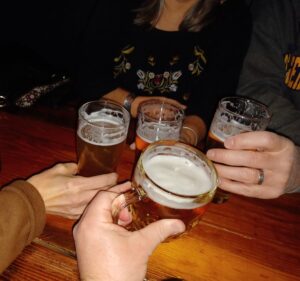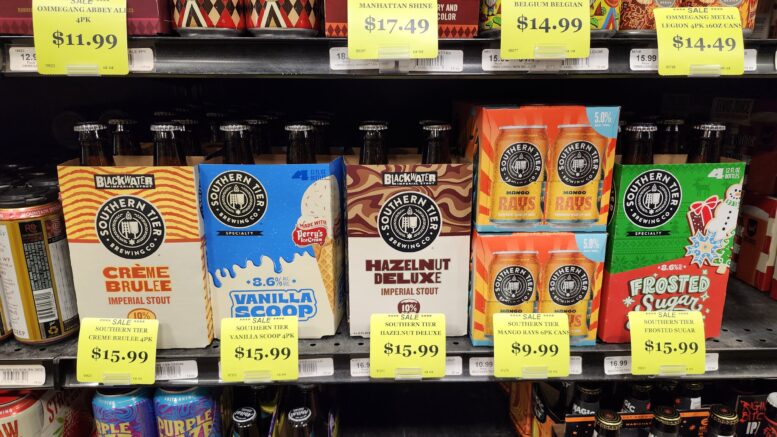After a several-year pause, Colorado’s long-running liquor wars are returning to the state Capitol this year, with two bills that could reshape how alcohol is taxed and sold scheduled for initial committee hearings over the next week.
House Bill 1373, sponsored by Democratic Reps. Judy Amabile of Boulder and Naquetta Ricks of Aurora, would eliminate grocery stores’ ability to operate multiple liquor stores, which they received in a bill known as the “Grand Compromise” in 2016. It also would limit the alcohol strength of beers and wines sold by grocers, would require grocers to keep all beer in wine in one section of their stores and would remove a cap on how much alcohol restaurants could buy from retail liquor stores.
Senate Bill 181, sponsored by Democratic Sens. Kevin Priola of Henderson and Chris Hansen of Denver, would create a fee, similar to an excise tax, on alcohol manufacturers and wholesalers in Colorado that would double the amount that many pay in excise fees. The money would go into a newly created enterprise that would fund alcohol- and related substance-use-disorder prevention, treatment and recovery services, and the bill would exempt the enterprise from a cap on enterprise revenue that voters approved in 2020.
The measures come just 16 months after voters approved a ballot initiative to allow grocery stores to sell wine as well as beer, and major grocers argue that the limitations that HB 1373 would place on grocery alcohol sales is a direct repudiation of that vote. Both bills also come as sales of beer in Colorado have fallen in three of the past four years, dealing a blow to a sector that, for more than a decade, was a leading economic engine in the state.
Why backers have pushed for the liquor bills
The bills also come after a Liquor Advisory Group appointed by Gov. Jared Polis met for a year to try to figure out consensus fixes to state law that could modernize alcohol sales and end the decade-and-a-half of industry in-fighting. While that group issued a multi-point recommendation, however, no bill has been introduced to make suggested changes.
Proponents of HB 1373 argue Colorado’s local liquor stores, already hurting from the 2016 law that permitted grocers to sell full-strength beer and let grocers buy out the licenses of two local liquor stores in order to operate their own, are reeling from the loss of wine sales. Some liquor-store owners told Colorado Public Radio that they’ve wine-sales drops of 20% to 30% that left them reducing staff or, in a few instances, closing.

Colorado state Sen. Chris Hansen discusses a bill on the Senate floor during the 2023 session.
Meanwhile, Hansen said his interest in SB 181 has been driven by what he feels is a disconnect between the increasing state spending on alcohol-disorder services — a total he estimated as being between $250 million and $400 million — and the fact that Colorado’s excise tax has not risen since 1981. That’s left the state with an excise tax approximating .7 cents per can of beer that brings in just $53 million a year, a tax burden on alcohol manufacturers and wholesalers that ranks among the lowest in the U.S.
“What we’re trying to accomplish is aligning the product with its harms and its costs,” Hansen said in an interview, noting that inflation has risen by four times since 1981 but that SB 181 only doubles the fee and tax burden on producers. “So, the whole argument that this is unfair, and this is hitting an industry unfairly, doesn’t make sense to me.”
Grocers decry ‘precedent’ of HB 1373
Yet opponents say that both bills are being unfair in multiple ways. And with HB 1373 scheduled to be heard at 1:30 p.m. Thursday in the House Business Affairs & Labor Committee and SB 181 slotted for a 2 p.m. hearing Tuesday in the Senate Finance Committee, those clashing viewpoints will come to a head quickly.
Leading the charge against HB 1373 are grocers who argue that voters passed Proposition 125 to permit grocery-store wine sales in 2022 because they wanted convenience, yet the bill would take that away from them. It would bar grocery sales of any beer or wine above 14% alcohol by volume — a limit that would cancel sales of some red wines and a few strong beers — and require displays of beverages only in a single location, nixing end-cap placements many stores now have.
More problematically, said Kroger regional public affairs director Kelli McGannon, it would convert all active liquor-licensed drugstore licenses — those that permit sales of spirits as well as beer and wine by grocers — to fermented-beverage and wine retailer licenses. That would mean the licenses that grocers had to buy from area liquor stores would go up in smoke, disallowing in-store spirits sales except for licensees with only a single location, who could convert that to a retail liquor store license.
Safeway has four liquor-licensed drugstores statewide, while Kroger/King Soopers has five such licenses, with two more pending.
Liquor stores lead the charge for bill
“It sets a bad precedent where voters approve something and we take a step back from what voters approved,” McGannon said. “This is about telling us where we can put things in our stores and not telling the same thing to liquor stores. It has to be a level playing field. This is about fairness.”
But Colorado Independent Liquor Stores United, a group of 1,600 retailers, argues on its website that HB 1373 is necessary to prevent anti-competitive behavior such as big-box grocers selling alcohol below the cost they’ve paid to wholesalers or getting “free labor” from distributors who stock and display their products — practices the bill prohibits. The group argues too that the placement of beer and wine throughout grocery stores is raising safety, theft, youth-access and alcohol-abuse concerns.
“The big-box and grocery chains abandoned the legislative ‘Grand Compromise’ by passing Prop. 125,” the site states.
Another provision in HB 1373 would lift the existing $2,000 cap on the amount of alcohol that liquor stores can sell and deliver to restaurants. Restaurant-industry leaders have complained that cap has left some restaurants, particularly those in mountain towns further from distributors, unable to restock during large customer rushes like those that can occur on holiday weekends.
Brewers, alcohol producers protest proposed fee

Patrons clink glasses at a Denver brewery.
SB 181 is raising alarms across the alcohol sector because of the significant increase it proposes on taxes and fees to makers and sellers — a cost that will be passed along to consumers at a time when inflation already is restraining purchases. It also has angered proponents because the bill would exempt itself from the 2020 initiative that requires any new enterprise that receives more than $100 million in revenue in its first five years to get voter approval to keep the money — an exemption that legislators can pass because Proposition 117 was a statutory rather than constitutional provision.
The enterprise is authorized to charge a fee of 16 cents on every gallon of malt liquor and hard cider distributed in Colorado, 14.7 cents on every liter of wine and $1.20 on every liter of spirits. The bill exempts smaller manufacturers who pay the lowest tier of federal excise tax — for breweries, for example, that is those producing less than 60,000 barrels a year — and allows the enterprise board to raise fees in the future.
While the bill would affect only about 10 breweries in Colorado immediately, its impact would be between $250,000 and $300,000 a year on those making 60,000 barrels per year — a substantial hit, Colorado Brewers Guild Executive Director Shawnee Adelson said. And because it sets up such a steep hike in fees once a brewer crosses the 60,000-barrel line, it disincentives growth like the expansion that Prost Brewing just unveiled in Northglenn in its quest to grow nationally and produce 50,000 barrels or more, she said.
Sponsor: “Rounding error” won’t change consumer behavior
After more than a decade of significant growth, beer sales in Colorado are on the decline, which led to 34 in-state brewery closings in 2023 and nine so far this year, leaving a once-expanding sector flat in locations and down 3.2% in sales last year, Adelson noted. Meanwhile, cost of supplies for brewing and packaging are up 20% to 50% since the start of the pandemic — costs smaller breweries are eating because they can’t raise prices that much and still be competitive with national and international makers, she said.
“There is continued pressure on brewers to cover all kinds of costs,” Adelson said, pointing to breweries also having to start paying a fee in 2026 to stand up a statewide recycling program. “It could lead to layoffs. It could lead to less investment in new packaging equipment. And it could lead to less production overall or less new production.”
Hansen pushed back, saying that the 200% increase in fees will amount to an added cost of 1.4 cents per can of beer or 8-1/2 cents per six-pack — a figure Adelson said will grow because producers will hike costs for distributors, who then will hike them for retailers. Not only will that not be enough to affect consumer purchasing behavior, Hansen said, but unlike heavy taxes on cigarettes that were meant to reduce smoking, this isn’t meant to reduce drinking so much as to get the industry to pay for alcohol-caused problems.
“This is a rounding error,” he said of the extra cost to producers and distributors. “That would require evidence that the marginal consumption will drop if you add a penny onto a can. And there is no evidence that will happen.”
Discussions ongoing on other liquor bills
Adelson also criticized SB 181 for allowing funds to go to treatment of disorders related to other substances such as opiates, though Hansen said that would only happen if benefitting individuals were addicted to both alcohol and something else. Plus, Adelson noted that the bill would allow state funding to go to for-profit treatment centers, and it could cover costs not covered by insurance, which could disincentivize insurer payments for treatment.
The battles over these bills could overshadow the success of another measure related to alcohol sales — SB 20, sponsored by Democratic Sens. Dylan Roberts of Frisco and Nick Hinrichsen of Pueblo, which would make permanent an allowance for restaurants that deliver food or offer pick-up food to go to include alcohol in those orders. That measure, which passed the Senate by a 29-2 vote and is scheduled for a hearing before the House Business Affairs & Labor Committee on Wednesday, has resulted in sales boosts for many of the 1,872 restaurants that have gotten to-go drink licenses, Roberts said.
The controversy over these bills also likely have pushed debate in Colorado out one year on an idea now being taken up by other states — the allowance of breweries to ship beer directly to customers, as wineries in 47 states can do. Sam DeWitt, state government affairs manager for the Boulder-based national Brewers Association, said that while officials believe that could boost Colorado sales without taking any business from liquor stores, the bevy of other alcohol discussions likely will delay any push for it until 2025.
